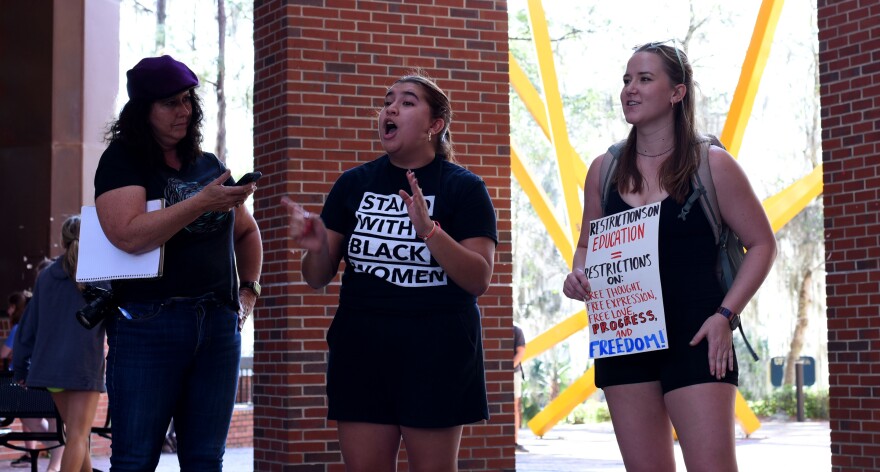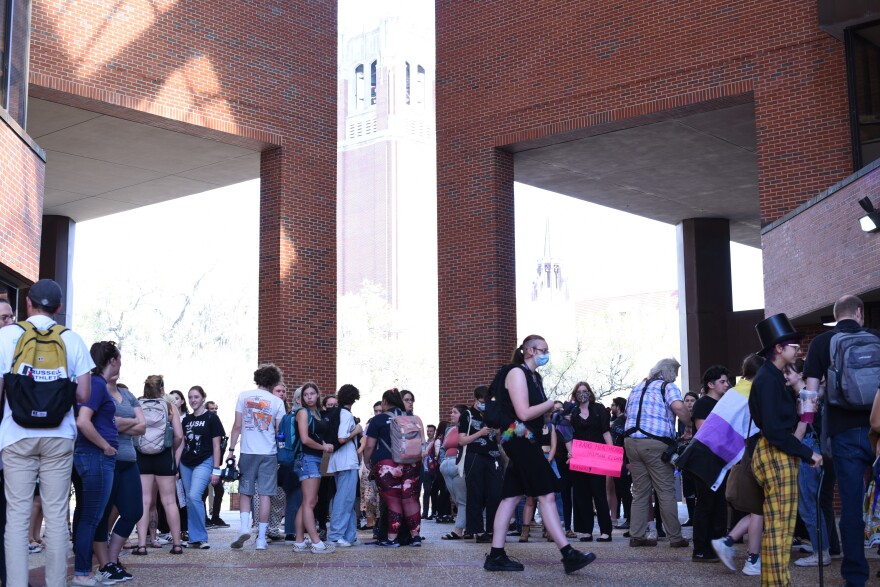College students across Florida are organizing a protest campaign against a new proposal backed by Gov. Ron DeSantis that would remove degree programs that teach critical race theory and gender studies.
“Students are rallying to reject House Bill 999,” said Bryan Gonzalez, a fourth-year political science student at Florida State University. “The rally is on Wednesday at 11 a.m. across the street from the Florida Historic Capitol.”
Students have already protested their opposition by staging a walkout on Feb. 23 at six universities. Their plans call for more protests to resist signed legislation that affects the freedom of education in public universities.
In 2022, DeSantis signed the now unconstitutional ‘Stop W.O.K.E. Act,’ which would have placed strict limitations on Florida employers speaking about diversity, equity and inclusion teachings. The act was deemed unconstitutional because of its infringement on First Amendment rights.
Under DeSantis' leadership, the Florida Department of Education banned schools from teaching Advanced Placement African American Studies in January. The course was rejected because it was pushing a “political agenda.”
“We believe in teaching kids facts and how to think, but we don’t believe they should have an agenda imposed on them,” DeSantis said at a press conference in January.
House Bill 999 would limit classroom discussions on critical race theory, identity politics and would eliminate any college major or minor that relates to theory and gender studies. The measure would also place restrictions on student and faculty speech outside of the classroom, such as faculty-organized panels, conferences and guest lectures if state lawmakers find the topic unacceptable.
“There is a push for events to inform and shed light on HB999 and also to speak to committees once they’re announced,” Gonzalez said. “We plan to get as many people involved as possible.”
The DeSantis proposals have drawn support from conservative groups.
Moms for Liberty, a nonprofit organization rooted in parental rights at all levels of government, said bills like House Bill 999 are not bipartisan issues. The group said parents deserve to know what their children are learning in school, and the information should not dictate children’s beliefs.
Founded by Tiffany Justice and Tina Descovich, the organization has stuck by DeSantis and the state’s decisions to minimize references and education seen as indoctrinating “woke” mindsets in Florida schools, Justice said.
“It’s all about transparency,” Justice said. “Hopefully, they can build some trust between schools and parents because right now that trust seems broken.”
Students oppose the proposal because it would remove courses that teach race and gender studies. Statewide organizations are fighting for academic freedom with what is being taught at public universities.
The University of Florida College Democrats sent out a statement that includes information about House Bill 999 and how it affects students across Florida universities.
“These measures, along with the efforts to defund diversity, equity, inclusion and the audit of gender-affirming care on university campuses, are blatantly attacking our student communities as well as our academic freedom,” University of Florida College Democrats said in the statement. “Join us, along with universities across the state to stand up against Ron DeSantis’ reign of terror by taking action.”
On Feb. 23, students staged a statewide walkout to challenge DeSantis’ request for all Florida public universities to provide data from health services on transgender students who received gender dysphoria treatment over the past five years. Global news publication, Insider, has confirmed that six of 12 universities have complied with the request: the University of Florida, Florida State University, the University of North Florida, the University of Central Florida, Florida A&M University and Florida International University.
“This isn’t a political protest,” said Sabrina Briceno, a third-year political science and public relations student at the University of Florida and president of the school’s College Democrats chapter. “This is a protest for academic freedom. We should not have government involvement in our education. Not in the way that we should choose our coursework. Not in the way of what’s funded and what programs are available to us. The government should be here to support us. Not take away that support.”
The walkouts were organized by Ben Braver, a junior at the University of South Florida. He led the initiative known as Stand for Freedom Florida, a movement that supports diversity and freedom in education. Students who are a part of the Florida College Democrats and Dream Defenders, a nonprofit organization, helped organize the walkouts in response to DeSantis requesting records of transgender students who sought care at Florida public universities and plans to rid of critical race theory programs. The data survey asks what services these universities are spending on transgender medical services, a breakdown of how many students received treatment for gender dysphoria and their ages.
“FSU’s compliance with Ron DeSantis’ request is disheartening,” said Katherine Cintron, a fourth-year studio art major at Florida State University. “I personally know several trans students who feel violated and are under unnecessary scrutiny for their own personal decisions. Why should I support a university that does not support my fellow peers?”
College students across Florida hope to push back the governor’s plan to ban programs of diversity, equity and inclusion, restriction of courses dealing with race, policies targeting the LBGTQ community and students of color.
“I am beyond disappointed with our school’s compliance to Ron DeSantis,” said Grant Rogers, a first-year psychology student at the University of North Florida. “Our entire school’s identity has been built off of diversity, equity and inclusion of everyone no matter of race, sexuality or gender. Our interfaith centers and LGBTQ+ center are top-notch and have been recognized nationally for how good they are. To strip those resources away from those who need it is not only going to worsen the education here, but strip UNF’s identity.”
Megan Bettley, a first-year public administration graduate student at Florida State University, said she thinks that universities are at risk with the release of medical information.
“University students are at risk,” she said. “More specifically, transgender students across the state of Florida are at risk. Our students should be safe and supported on our campuses, but instead, our transgender students are being attacked. To put it simply, our universities are under attack.”
Dr. Kenneth B. Nunn, a law professor at the University of Florida and associate director of the Center on Children and Families, said that officials, who side with DeSantis, do not care about African American history, diversity, equity and inclusion.
“They want to stop critical race theory,” he said.
According to Richard Delgado, a law professor at Seattle University, critical race theory is a collection of activists and scholars interested in studying and transforming the relationship among race, racism and power.
“It not only tries to understand our social situation, but to change it; it sets out not only to ascertain how society organizes itself along racial lines and hierarchies, but to transform it for the better,” Delgado said.
Karin Rosemblatt, regional council member representing Florida and other southern states at the American Association of University Professors, condemned the barrage of bills making its way through the Florida Legislature. The limitations on majors and education would jeopardize academic freedom, according to Rosemblatt.
“DeSantis and his allies care more about perpetuating their power than they do about cultivating the imagination and critical thinking skills of students and the excellence of institutions of learning,” Rosemblatt said.
After the walkouts, some universities hosted “teach-ins” to educate students and members about black history and how to access educational materials within their libraries.
The Samuel Proctor Oral History Program, a community-based oral history fieldwork at the University of Florida, organized a presentation at Marston Science Library at the University of Florida on Feb. 23.
“A walkout is just for us, at the University of Florida, to stand in community,” Briceno said. “But, when you follow it up with teach-ins, like the Samuel Proctor Oral History Program is doing, you can actually learn about what’s going on behind the scenes of the academic implications of it all. We have power in numbers. We are stronger when we are together.”




